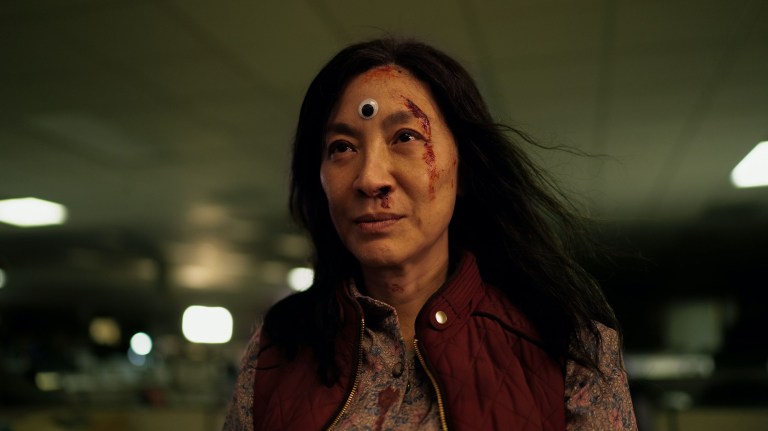
3 Red Flags “Don’t Worry Darling” Exposes About Narcissistic Cults In Love, Family, And Work
There were many critics of the psychological thriller movie Don’t Worry Darling (2022) when it first came out, but I personally loved its depiction of how narcissistic cults operate and consider it one of the most horrifying movies ever made to portray the “awakening” (literally and figuratively) to the madness and methods of cults. In the movie Alice (played by Florence Pugh) and Jack Chambers (played by Harry Styles) are in a seemingly “utopian” and isolated community called Victory where the 1950’s housewife aesthetic and lifestyle thrives. Terrifying community “synchronization” activities among the women align them with the agendas of the cult, the beliefs of the cult are constantly instilled in them through propaganda to keep them obedient and docile wives, and most members of the cult appear to obey its rules – until there’s a “glitch in the matrix” and scapegoats of the cult like Margaret start realizing there’s more than meets the eye in this secret community. Not all is what it seems and as Alice begins to question the reality around her and raise questions about the community to the charming cult leader, Frank (played by Chris Pine), she is ultimately punished, gaslighted, and silenced in brutal ways. The movie also holds a shocking plot twist at the end that is jarring to viewers and leaves them with more questions than answers.
Who Is A Cult Leader?
When we think of cult leaders, we think of infamous predators like Jim Jones, the charismatic preacher who led his followers into mass suicide, or Charles Manson, the psychopathic leader of the Manson Family who passed himself off as the second coming of Jesus Christ. Yet cults can be far less visibly nefarious and blatantly violating – and they can exist across diverse contexts – not just doomsday and religious cults. Narcissistic cults can exist within the nuclear family, the harem of a narcissistic partner where “followers” are taught to compete for the attention of the cult leader, friendship groups or social circles, academic circles, sex cults (such as the New York-based NXIVM cult which encouraged sexual abuse and horrific bodily “branding”) toxic workplaces, the bubbles of political groups, the aggressive “fandoms” dedicated to celebrities who act as attack dogs for the celebrity they worship or even the “one-man” cult of an emotionally abusive romantic relationship.
When narcissistic or psychopathic leaders succeed in leading groups, they can easily take on cult-like features. The most powerful antidote to a cult? People who question the grandiosity, perceived omnipotence or omniscience, unethical practices, beliefs, and attitudes of the cult and the cult leaders. This is why those who resist cult-like groups tend to be punished, scapegoated, or made the black sheep. Here are three red flags you may have been targeted as a black sheep or scapegoat or might be part of a narcissistic cult in love, work, family, or friendship:
1. You are love-bombed, and then devalued and gaslit if you question the cult. Your labor is exploited to benefit the cult, but your strengths are demeaned and your identity is diminished. You are made to compete with others or pitted against others for resources, attention, healthy praise, or the promises that were first made.

In healthy romantic relationships, familial groups, friendships, social circles, academic or professional groups, you will feel respected and cherished long-term with a stable sense of consistency. The experiences you have in healthy groups will feel rewarding and fulfilling and there will be mutual appreciation and a “I’ve got your back, you’ve got mine” mentality that thrives on a core foundation of integrity and respect. On the other hand, when you first enter a cult-like group, you will inevitably be love bombed profusely, flattered excessively, and made to feel special and unique, only to be devalued or intermittently mistreated unpredictably (or when you question the cult). Like Alice, you are promised an eternally happy life so long as you go along with the cult’s demanding expectations and you are indoctrinated into intense “bonding” activities that promote a sense of community – not knowing you may become the sacrificial lamb. Narcissistic cult leaders – whether they be friends, romantic partners, family members, colleagues, fellow academics (in university settings), spiritual community leaders or similarly minded political affiliates – need to idealize you and put you on a pedestal in order to win your initial trust. They must promise you happiness, health, and wealth in order to get you interested in the first place – they must promise to satisfy a deep craving within you, or some unique need, in order for you to make tremendous sacrifices for the cult. This is a common grooming tactic in cults to become ensnared and invested in the cult and provide value for cult members. You are made grandiose promises from cult leaders who dangle the carrot of potential rewards to get you to undertake intensive labor for them to benefit them and the members of the cult. However, when you start to become more independent or show critical thinking skills, you are inevitably pitted against more “obedient” or higher-ranking members of the cult to teach you a lesson. The cult leaders or members may ostracize you or belittle you despite benefiting from your labor and how you boost the cult’s image. You are forced to compete and compare in order to survive. There may be a withdrawal or withholding of resources, attention, or praise, as well as a return of love bombing when you do comply, to condition you to serve the cult over time.
2. Healthy groups reward empathic, hard-working, intelligent, talented people who operate with integrity. In narcissistic cults, empathic, talented group members with integrity tend to be exploited, scapegoated, or punished, while sociopathic group members tend to rise in the ranks – yet all are vulnerable to being devalued in the end of the day.

In Don’t Worry Darling, Alice is navigating a world where she knows something is deeply amiss – but she has been taught by the cult-like community around her to silence her inner voice. She begins to experience cracks in her reality, experiencing what seem to be hallucinations where she is being squeezed in by the walls and windows around her, where she cracks eggs that turn out to be empty, or witnesses plane crashes in the distance. She witnesses her husband do an endless creepy performative dance to impress Frank at a work event, revealing who’s truly in charge as the puppeteer and puppet master. She is startled when she sees Frank watching her and Jack have sex, and unbeknownst to her at the time, the sexual activities she engages in at Victory are far from consensual, given the true nature of the community that is revealed later on. At one point, she even feels compelled to suddenly suffocate her face in saran wrap to test her own mortality. When she questions Frank at the dinner table and fellow members to ask themselves why all their back stories seem so similar and why the community asks them to engage in certain bizarre activities, she ultimately experiences backlash and stigmatization, and is later taken away and subjected to electroshock therapy. This reveals the inevitable price you pay when you go against the cult’s unethical practices.
Heed the lesson in Don’t Worry, Darling: take care to notice the traits and qualities of the members of any kind of social group you’re in and how they are treated. In healthy groups, those with integrity, those who are most empathic, hard-working, loving, talented, intelligent, and generous (with boundaries in place), tend to thrive. They are consistently celebrated and supported, given opportunities to showcase their positive qualities and strengths. Healthy groups take care of their “members” whether this “membership” exists in friendship, family, work, or a romantic monogamous relationship. They encourage and support hard-working and empathic people not because of what these people can do for them, but rather because of who they genuinely are. They hold toxic people accountable and issue appropriate consequences to those who attempt to bully or demean others or engage in violations.
In a narcissistic cult, however, the most empathic, talented, successful, and intelligent members tend to be a targeted because they are threatening to the status quo of the group – they may be more prone to question unethical practices or provide immense value to the group that the cult wishes to exploit for their own gain without maintaining integrity or compensating them fully for the value they offer. Like Jack and Alice, members of cults are asked to perform for the cult as the price of admission, and make numerous sacrifices to their identity and well-being, betraying their own values to prioritize the cult. Cult members develop “trauma bonds” with their cult leaders, becoming more enmeshed and attached out of survival even as more betrayals occur.
Generally, however, even those who are more sociopathic can also be devalued in the cult eventually even when they appear to be rewarded because the cult needs to recycle “members” in order to keep up the power dynamics and establish their authority. The price of maintaining membership of such cults is ultimately silence and emotional suppression. Read the examples below to see if you resonate with this manipulation tactic.

EXAMPLES OF MICRO-CULTS IN REAL LIFE SETTINGS
Take, for example, the intelligent, perceptive student who speaks up in a class with a renowned professor and raises an argument against the questionable “opinions” in the classroom regarding human rights violations during a discussion – only to be later mocked or alienated by class members and the professor. Or the romantic partner who gaslights their girlfriend or boyfriend when they are questioned about spending far too much time with their ex or a suspicious co-worker. The family member who is scapegoated because they stand up against the bullying tactics of the narcissistic “cult leader” of the family group. The hard-working colleague who experiences workplace mobbing or a withdrawal of attention when they ask for more transparency in pay or follow up on what was promised to them in terms of progression. Or the person who exposes the unempathic and callous nature of a narcissist in their friend group, only to be abandoned because the charismatic friend is deemed more “popular” despite their bullying tactics. Scapegoating can take place in many ways, across many different circumstances. These are only a few examples.
3. In healthy groups, transparency, open communication, valid feedback, and facts are valued. In cult-like groups, information is presented in a bubble, and misinformation and smear campaigns are what sustain the cult’s survival and “legacy.”

Healthy groups value transparency, dialogue, and openness. They welcome valid feedback that allow them to improve and appreciate empathic members of the group providing that feedback (however, one must note that there are certainly times where victim-blaming, hypercriticism, excessive nitpicking, misinformation or discriminatory beliefs are sometimes falsely presented under the guise of feedback and should not be welcomed as such). When Alice begins to point out and notice extremely unsettling events in her reality – from Margaret’s apparent suicide to red planes crashing off in the distance, she is gaslit and told she is imagining things out of stress. Members of the cult are discouraged from venturing out beyond in the desert where their husbands drive to for work because if they do, they will discover the true nature of the world they’re living in. This is in alignment with how real life cults operate: members must obey and comply, or be gaslit, devalued, coerced, and controlled.
When Alice starts to fight back against the injustices of the cult, she risks her own life to try to escape. Ultimately (major spoilers ahead), Alice discovers the terrifying truth: she is in an alternate reality simulation created by Frank – and her deadbeat boyfriend has paid Frank so they can live in this simulated reality where he has more power over her and can embody the more traditional version of masculinity not accessible to him in the modern world. In the real world, Alice is actually a successful surgeon in her “real life” and her boyfriend Jack is a struggling misogynist who feels envious and emasculated. Alice is not just in one cult, it turns out, but in two: the community of Victory, and the narcissistic and entitled one-man cult of her boyfriend who kidnaps her and forces her into submission, in a lifestyle she would never choose for herself.
This is analogous to the ways cults convince their members they are powerless without the cult just to maintain control and power themselves. It is usually an illusion, as cults are actually dependent on the loyalty and labor of its members to survive. Yet they must erode the identity and strengths of their members to keep them compliant.

Cults thrive in secrecy, with abuse taking place behind closed doors. Like the community of Victory, they create a bubble of misinformation to sustain their survival, often launching smear campaigns against scapegoated members of the group who question their practices. They spread blatant lies and falsehoods to paint any detractors of the group as the “Other,” or “crazy” while also depicting their transgressions and violations as justifiable. We see this vividly when Alice is subjected to electroshock therapy just for questioning the cult’s practices and told she is mentally ill or in need of medication for daring to speak out and recognize the facts. Narcissistic cults override the boundaries of not just people outside the group, but within it. They take without asking and exploit without apologies. They promise you rewards with grand gestures, only to reward less hard-working members who are more compliant or aligned with their agendas while using your labor to uplift those who haven’t earned such privileges. They may spread myths about themselves or others that encourage spiritual bypassing or demand obedience, taking on a God-like authority to dole out punishment or rewards to “train” their members to behave according to their distorted beliefs.
If you recognize such tactics, you may be in a narcissistic cult and you may benefit from a trauma-informed mental health professional to “deprogram” yourself from the harmful beliefs of such a group. It is time to honor yourself and your boundaries. You deserve to thrive in healthy relationships, friendships, social circles, academic communities, workplaces, and family relationships.











